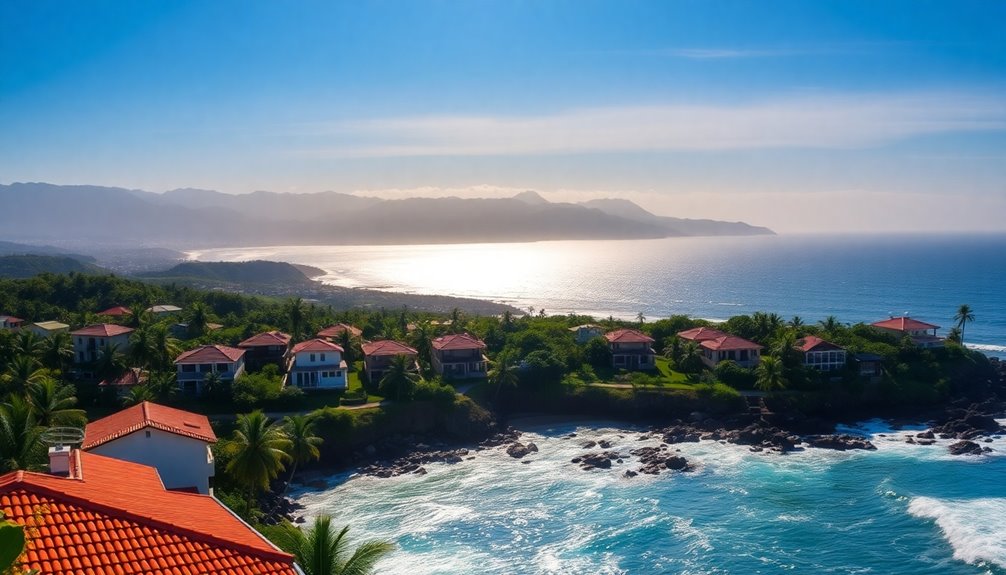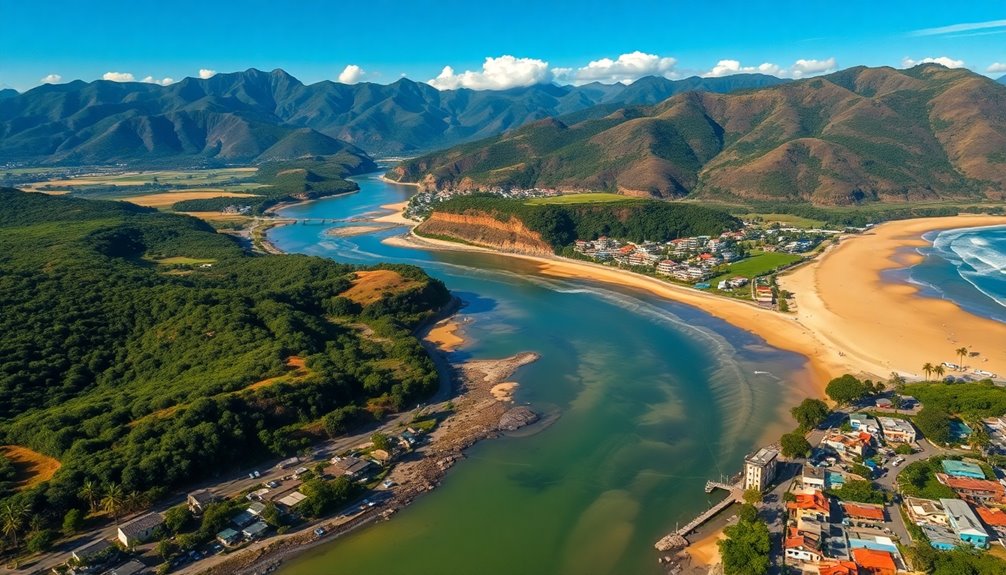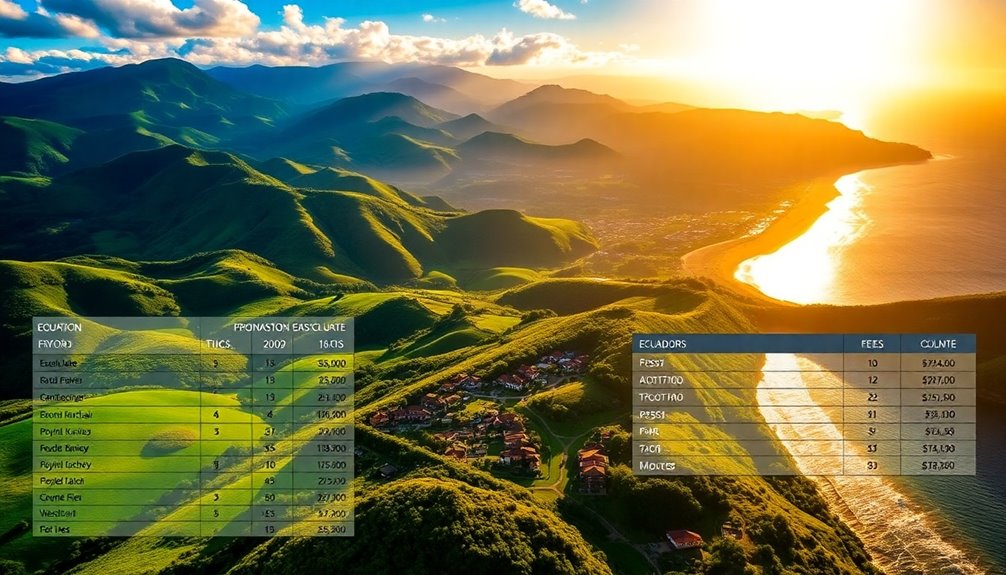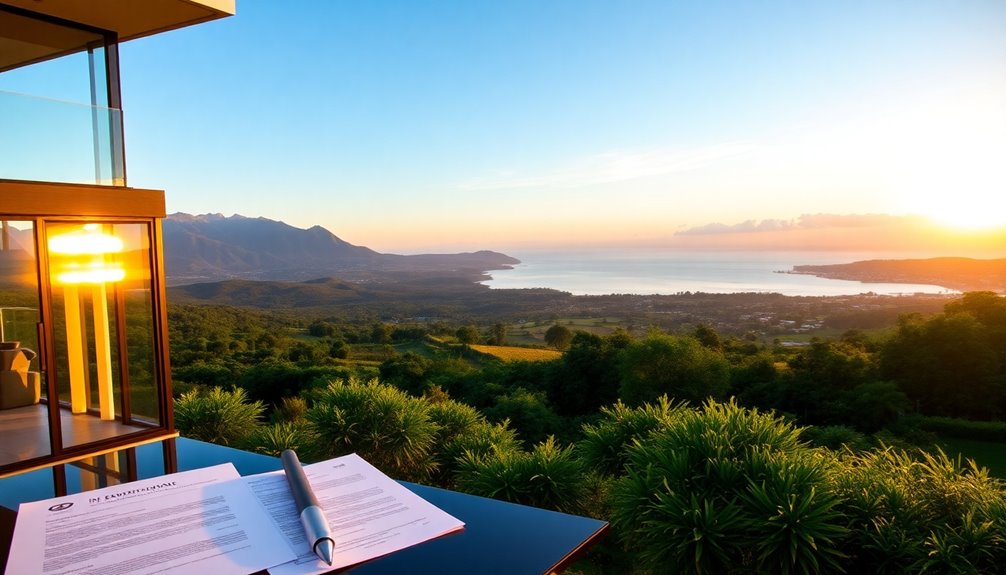Ecuador's property market is an exciting opportunity for you, bridging the stunning Andes and the beautiful coast. You can buy land or homes with full ownership rights, and there's no need for a local citizen on the deed. Financing options are diverse, from local mortgages to seller financing, making it easier to invest. Be mindful of closing costs and taxes, which are generally manageable. The market is recovering well, with rising property values and strong rental yields in prime areas. You'll find plenty of investment potential in both the mountains and beachfront locations, so explore how to maximize your opportunities.
Key Takeaways
- Foreigners can purchase various property types in Ecuador, including land, condos, and houses, with full ownership rights.
- Financing options are available through local banks, with interest rates ranging from 5% to 12% for mortgages.
- Closing costs typically range from $2,500 to $3,500, including transfer tax and legal fees.
- The real estate market is recovering, with rising prices in high-demand areas like Cuenca and Salinas.
- Attractive investment opportunities exist in tourism and coastal properties due to strong demand and ongoing projects.
Ownership and Eligibility

When it comes to property ownership in Ecuador, you'll find that foreigners enjoy nearly the same rights as citizens. You can purchase land, condos, and houses throughout the country, with fee simple ownership meaning you own the property outright, including any improvements.
The Ecuadorian constitution supports your right to private property, guaranteeing you can buy beachfront property without the limitations found in other countries. Additionally, foreign buyers can engage in real estate transactions without needing a local citizen on the deed, simplifying the process significantly.
Anyone from any nationality can buy and hold property, making it an attractive opportunity for international investors. While residential property ownership is straightforward, be aware that purchasing agricultural land may require government approval.
Generally, you can't buy property within 50 kilometers of international borders or in areas deemed of national security interest. Certain coastal and natural areas may also have restrictions due to environmental protections.
To successfully navigate the purchasing process, you'll need a valid passport and a solvency document from the Ecuadorian Property Registry to guarantee the seller has clear rights.
A notary must sign off on the deed, and it should be registered with the local municipality. If you're not fluent in Spanish, consider hiring a translator or designating a Power of Attorney to assist you.
Financing Options

When considering financing options in Ecuador, you'll need to meet specific credit eligibility criteria. Local banks often require proof of income and a good credit history, which can be influenced by your marital status. Understanding these requirements can help you navigate the lending landscape more effectively. Additionally, the Ecuadorian mortgage market is still developing compared to the US, so exploring alternative financing solutions can be beneficial.
Credit Eligibility Criteria
Understanding the credit eligibility criteria for financing options in Ecuador can greatly enhance your property investment experience.
When considering financing alternatives, direct seller financing is a popular choice. Instead of needing a traditional bank loan, you can negotiate an installment plan directly with the seller, which offers more flexibility and often bypasses the challenges foreign buyers face with local banks.
If you have a combined income between $1,500 and $2,800 per month, the VIP Loan Program could be a great fit. This program, especially advantageous for expats married to Ecuadorian citizens, offers subsidized loans at an average interest rate of 4.9%. It's designed to make homeownership more accessible for those with modest incomes, as eligibility is typically based on a combined income that meets specific criteria.
You might also consider financing through your home country. If you have an established credit history there, securing a loan could be easier, often with lower interest rates than those available in Ecuador.
Keep in mind that buying property involves various costs, such as lawyer fees and public notary charges, along with down payments and potential insurance.
Make sure to consult local real estate experts to navigate these complexities effectively.
Financing Through Local Banks
Financing through local banks in Ecuador opens up various options for property buyers, especially those who prefer traditional mortgage routes. Institutions like Banco Guayaquil offer home mortgages with flexible payment plans and interest rates ranging from 5.5% to 8%.
Produbanco provides both fixed and variable rate loans, supporting foreign buyers with rates between 6% and 9%. Banco Pichincha allows for mortgage refinancing and offers low down payment options, with rates from 5% to 8.5%. While local banks present viable financing solutions, it's essential to recognize that they often prefer short-term loans and secured loans with collateral, which can result in lower interest rates. However, high interest rates compared to developed nations are common, typically between 5% and 12% or more.
In addition, the 52% increase in foreign investments in the last quarter highlights the growing appeal of the Ecuadorian real estate market for investors. Navigating this process can be challenging, especially for foreigners, as traditional mortgage options may be limited. Engaging with local real estate experts can provide valuable insights and help you understand the specifics of the local market, ensuring you find the best financing terms and successfully manage the paperwork involved in securing a loan. Furthermore, for those considering expanding their investment beyond Ecuador, it is worth exploring Colombian real estate investment opportunities. With a stable economy and a growing real estate market, Colombia presents an attractive option for savvy investors. Seeking guidance from experts in both the Ecuadorian and Colombian markets can help individuals make informed decisions and navigate the complexities of international real estate investing.
Fees and Costs

Steering through the fees and costs associated with property investment in Ecuador is essential for making informed decisions. Understanding these expenses can greatly impact your budget and overall investment strategy. Additionally, it's important to note that closing costs typically range from $2,500 to $3,500, which can aid in your financial planning.
Here's a quick breakdown of the common fees you'll encounter:
| Fee Type | Estimated Cost |
|---|---|
| Closing Costs | 2-3% of the sales price |
| Transfer Tax | 1.1% of sales price or assessed value |
| Notary Fees | 0.10% to several times monthly wage |
| Legal Fees | $300 to $600 (complexity-dependent) |
You'll also need to take into account additional costs. Real estate agent fees typically range from 4% to 6% of the sales price, paid by the seller. If you're working with a legal professional, their fees can be negotiated and usually fall between 1% to 3% of the property value.
Always factor in registration fees, generally around 0.10% of the property value. Being aware of these costs will help you navigate the process and avoid any unpleasant surprises down the road.
Taxation Overview

When investing in Ecuadorian property, you'll need to be aware of your tax obligations, including property tax and capital gains tax. Understanding these costs can help you budget effectively and maximize your returns. Additionally, there are various tax incentives available that can benefit your investment projects. Moreover, knowing that property tax, also known as impuesto predial, is levied by municipal governments is essential for understanding your financial responsibilities.
Property Tax Obligations
Managing property tax obligations in Ecuador is essential for any investor. Property tax rates range from 0.1% to 0.2% of the cadastral value of your property. In urban areas, expect to pay about $3 per $1,000 of your property's municipal appraisal, while in rural areas, it's around $2 per $1,000.
For a property valued at $50,000, your typical annual tax would be about $50. Local governments determine the cadastral value, which takes into account location, land size, and construction type. However, remember that municipal evaluations mightn't reflect current market values. Additionally, annual property tax is known as Impuesto Predial in Ecuador, making it important to familiarize yourself with this term.
You'll need to pay your property taxes annually, with deadlines varying by municipality. Payments can be made at municipal offices or online, but be mindful of late penalties. If you pay early, you could snag discounts of up to 10% in January, decreasing until July. After July, you'll need to pay the full amount.
Certain exemptions exist, such as for senior citizens with low income or properties used for charitable purposes. Understanding these obligations guarantees you stay compliant and make the most of your investments.
Tax Incentives for Projects
Ecuador offers a range of tax incentives designed to attract investments across various sectors, making it an appealing destination for property investors.
These incentives can greatly enhance your investment's profitability. Here are some key benefits to evaluate:
- Income Tax Exemptions: Operators in free trade zones enjoy a 0% income tax rate for 15 years, while investments in renewable energy projects are exempt for ten years.
- Sector-Specific Benefits: If you invest at least $100,000 in tourism, you can be exempt from income tax for seven years, provided you allocate 10% to rural tourism. Additionally, new corporations may qualify for a three percentage points reduction in income tax for up to 15 years.
- Special Economic Zones: These zones offer various tax benefits including exemptions from income tax and VAT, allowing for a more profitable investment environment.
- Employment Incentives: Hiring young employees can reduce your income tax by 20%, while hiring over 500 people can lead to a 90% reduction.
Market Trends

The real estate market in Ecuador is witnessing a dynamic recovery and growth phase, particularly after the global pandemic's impact. As of 2023, prices are on the rise again, especially in high-demand areas like Cuenca and Salinas. While the market had leveled off since 2016, supply is now closer to matching demand, making it a favorable time for you to invest. Given the recent increase in CPI Housing Utilities which reached 120.04 points in March 2024, this trend may contribute to rising property values and investment potential.
Here's a snapshot of current market trends:
| Region | Average Price Trends |
|---|---|
| Cuenca | Affordable but rising |
| Salinas | Strong demand, many projects |
| Coastal Areas | Generally lower prices |
Prices in some locations have dropped by up to 20% compared to 2019, creating opportunities for savvy buyers. Rental yields in prime districts can range from 7% to 8.5%, attracting nonresident and resident investors alike. Overall, Ecuador's real estate remains underpriced compared to other South American countries, making it an attractive option for investment, particularly in the tourism sector.
Legal Considerations

Investing in real estate requires understanding the legal framework that governs property ownership and transactions. In Ecuador, property ownership is protected under the Constitution, granting both Ecuadorians and foreign nationals similar rights.
However, there are key considerations to keep in mind:
- Property Restrictions: You can't own property near international borders or coastlines due to national security laws.
- Types of Properties: Different property types—residential, commercial, industrial, and agricultural—have varying regulations. Agricultural land often requires additional government approval for foreign buyers.
- Transaction Process: Start with a preliminary agreement (Promesa de Compraventa), conduct a thorough title search (Estudio de Títulos), and finalize the purchase with a notary. Don't forget to register at the local land registry (Registro de la Propiedad). Additionally, understanding the taxation and fees associated with property transactions is essential for budgeting your investment accurately.
- Due Diligence: Engage local legal experts to guarantee compliance with zoning and environmental regulations. Verify property titles and include dispute resolution mechanisms in your contracts.
Understanding these legal aspects guarantees you navigate Ecuador's property market effectively and protect your investment.
Frequently Asked Questions
What Are the Best Regions in Ecuador for Property Investment?
When you're considering property investment in Ecuador, focus on the Andean and coastal regions.
In the Andes, Cuenca offers a safe environment, affordable real estate, and strong rental yields.
Meanwhile, the coastal areas, like Salinas and Manta, provide excellent tourism potential and a growing economy.
Both regions have unique benefits, so weigh your priorities.
With careful research, you can find promising opportunities in either location that fit your investment goals.
How Does Ecuador's Climate Affect Property Value?
Imagine your property as a ship steering through turbulent waters. In Ecuador, climate affects property value like unpredictable waves.
Natural disasters, like floods and earthquakes, can sink values overnight. Coastal properties face rising sea levels, while highland homes contend with glacial melting.
As temperatures rise and rainfall patterns shift, the stability of your investment gets challenged.
You'll want to reflect on these climate-related risks before anchoring down in this vibrant yet unpredictable landscape.
What Cultural Considerations Should I Know Before Investing?
Before investing, you should understand Ecuador's rich cultural fabric. Embrace the local customs and practices, as relationships often influence negotiations.
Familiarize yourself with the significance of community and family; they play a central role in daily life. Respect for traditions is essential, so be open to learning from locals.
Also, remember that while English is common in urban areas, Spanish proficiency will enhance your experience and help you navigate contracts and negotiations effectively.
What Are the Risks Involved in Ecuador Real Estate?
Investing in Ecuadorian real estate can feel like sailing into uncharted waters.
You'll encounter language barriers that can cloud negotiations and strict regulations that may stall your projects. Bureaucratic red tape can slow you down, while relaxed construction standards might lead to unexpected repairs.
Political unrest looms like dark clouds, and natural disasters can shake your investment's foundation. Steering through these risks requires careful consideration and thorough research to stay afloat.
Can I Rent My Property as a Foreign Owner?
Yes, you can rent your property as a foreign owner in Ecuador.
You'll need to comply with local regulations, especially if you plan to use platforms like Airbnb.
It's essential to guarantee your property meets registration requirements and that you understand any applicable taxes, like the 22% on rental income for non-residents.
Hiring a bilingual lawyer can help you navigate the process and protect your investment effectively.
Conclusion
As you venture into Ecuador's diverse real estate market, remember that each region, from the majestic Andes to the sun-kissed coast, offers unique opportunities and challenges. Like a seasoned explorer steering through uncharted waters, being informed will help you make wise decisions. With the right knowledge about ownership, financing, and legalities, you'll be well-equipped to invest wisely. So, don't just dip your toes in; plunge in and discover the potential that awaits in this vibrant land!









